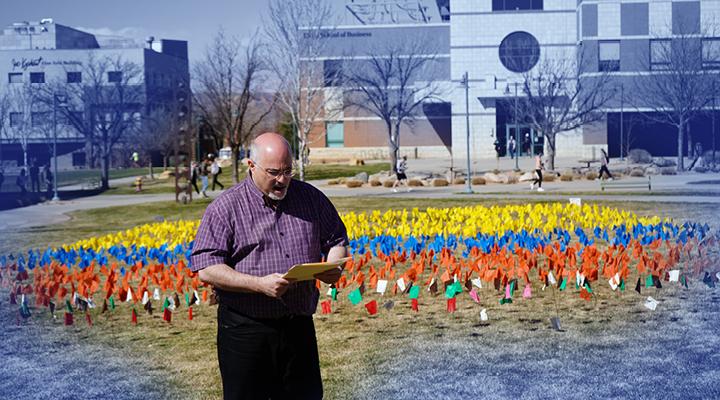CMU celebrates 20 years of civic dialogue during the annual Holocaust Awareness Series
People revisit individual memories and cultures revisit collective memories. In doing so, these memories are transformed with each recollection. Recalling the past means that memories are reconstituted and recontextualized, and new lenses are applied to old experiences. Remembering and revisiting is how people and cultures grow and transform.
In 2003, Vincent Patarino was a newly minted PhD and was hired as an instructor of history at Colorado Mesa University. One Saturday morning Patarino walked down his driveway and was astonished to find a sealed bag with a flyer and a rock. The flyer was menacingly anti-Semitic and included a horrific declaration that Jews, Blacks and Hispanics should be run out of town.
That day a project began to germinate in his mind. Patarino and a number of other CMU faculty planned and launched Holocaust Awareness Week in 2004 with a showing of the film The Architecture of Doom. He couldn’t have known that decades later the event would celebrate its 20th year.
The CMU Civic Forum’s Holocaust Awareness Series (renamed in 2013 to include all genocides) brings together students, faculty and members of the community to learn about the atrocities committed during World War II, and other moments in history that included genocide.
One of the first guest lectures Patarino brought to campus was by a survivor of the Auschwitz concentration camp which was met with overwhelming community support. In the years following its inception, other CMU faculty members, also committed to the cause, have been a part of the program. Over the last twenty years programming has included film screenings, lectures and ceremonies like the moving and reverent Field of Flags commemoration.
David Foster, a trustee of CMU and a supporter of the Holocaust Awareness Series, spoke about the importance of the effort before he hosted a recent series event held in conjunction with the City of Grand Junction and the historic Avalon Theatre. He participated in a post-screening dialogue following a film that explored the use of humor in processing the atrocity of the Holocaust.
"The Holocaust is one of the most significant events in modern human history, and it's essential that we remember and honor the millions of people who suffered and died during that time,” Foster said. “The Holocaust Awareness Series at CMU is an opportunity for us to come together as a community no matter our race, ethnicity or background and learn from the survivors, the experts and each other."
In 2019 the series established a partnership with the Rocky Mountain Regional chapter of the Anti-Defamation League to enhance programming. Scott Levin is the director of the organization and has also been a strong advocate for the series. He emphasized the need for continued education and awareness about the Holocaust, especially in light of rising anti-Semitism and other forms of hate.
"The Holocaust didn't happen overnight. It was a gradual process of dehumanization and discrimination that began with words and ended with genocide. We need to be vigilant and speak out against any form of hate, and the Holocaust Awareness Series is an important part of that effort,” said Levin.
The organizers of the series hope that by revisiting the past each year, CMU will continue to fulfill its mission by facilitating civic dialogue around the pressing challenges and advocating for a world where people are tolerant and respectful of one another. By reassessing the Holocaust, and remembering its lessons, remembrance will continue to transform one of the saddest and most tragic events in human history into a story that can help us understand the underlying causes of genocide and to eliminate its presence in future human endeavors.
When considering what the future holds for the series, Patarino reflected, “Every year when I plan the Series, I acknowledge the pain that many of our sessions will uncover. And yet, I remain hopeful that by revisiting past genocides, especially the Holocaust, and illuminating the current rise in antisemitism and white supremacy on social media, that through dialog and discussions with our audiences, we will create opportunities for civic engagement and action that is essential for a healthy democracy.”
